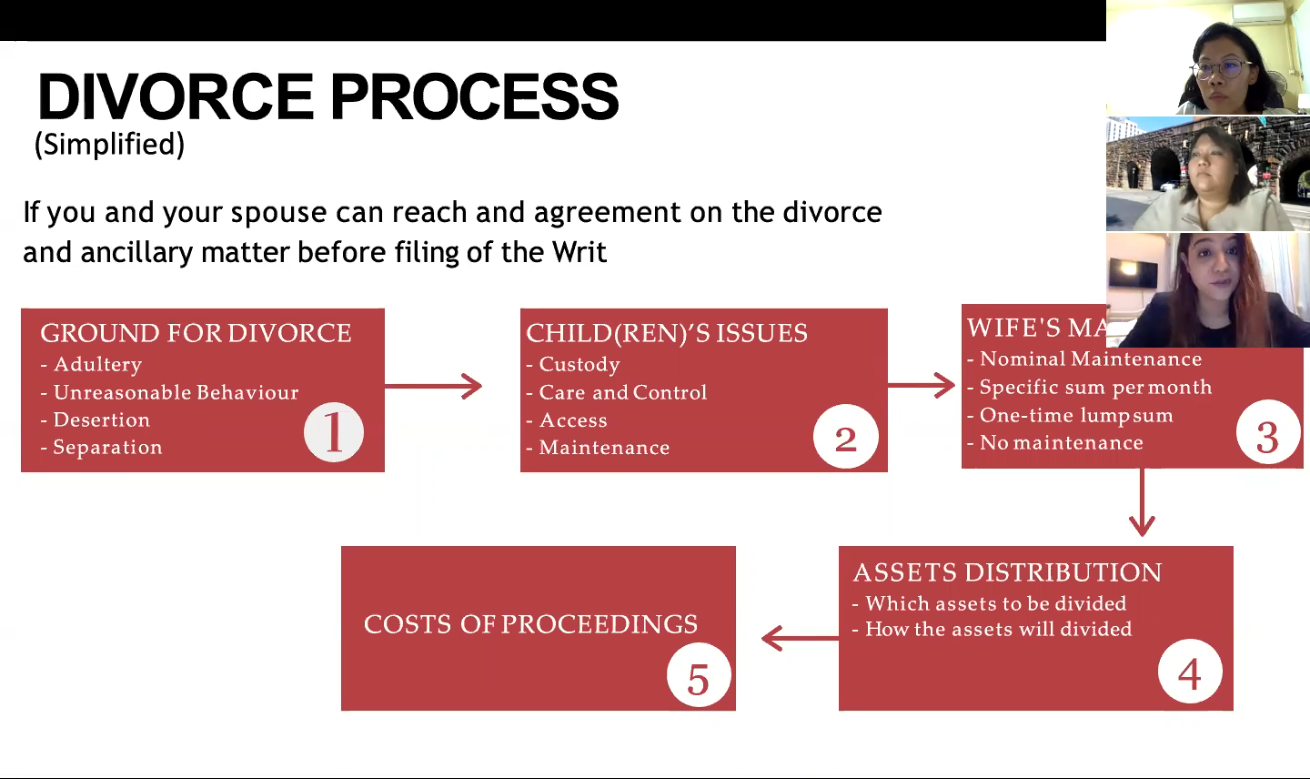-
Advocacy Theme
-
Tags
- Abortion
- Adoption
- Caregiving
- CEDAW
- Disability
- Domestic Violence
- Domestic Workers
- Harassment
- Healthcare
- Housing
- International/Regional Work
- Maintenance
- Media
- Migrant Spouses
- Migrant Workers
- Muslim Law
- National budget
- Parental Leave
- Parenthood
- Polygamy
- Population
- Race and religion
- Sexual Violence
- Sexuality Education
- Single Parents
- Social Support
- Sterilisation
- Women's Charter
A Recap: Talk series with IRB Law on domestic violence and divorce
July 22nd, 2020 | Family and Divorce, Gender-based Violence, Muslim Women's Rights, News
Written by Mahi Nair, AWARE intern
On 17, 19 and 22 June, AWARE hosted a series of online talks in collaboration with IRB Law, a Singapore-based law firm. IRB Law provides legal services and guidance across a broad range of issues, specialising in divorce, and is currently the largest Syariah law practice in Singapore. Over Zoom, the speakers—practicing IRB lawyers—gave presentations and answered questions on domestic violence and divorce.
The subject matter could not have been timelier during the COVID-19 pandemic. For many families and couples, being forced to stay at home for prolonged periods of time with one another has led to increasing tension and stress, culminating in violence and/or divorce. AWARE has received record numbers of Helpline calls relating to family violence—with a 137% increase (adjusted) in May 2020 over family violence calls from May 2019— while some law firms also reported an increase in divorce-related enquiries during the circuit breaker.

The IRB Law talks series aimed to support individuals facing domestic issues who might have few avenues for help due to financial issues or a troubled marital situation. The events provided a safe space for these individuals to learn about their legal rights and possible solutions to domestic issues, and obtain accurate, thorough legal advice free of cost.
The first session, on 17 June, was entitled “Domestic Violence and your Legal Rights”. Speakers Muntaz Zainuddin and Nur Izyan provided an overview of domestic violence in Singapore, highlighting the issues that arise as a result of quarantine during COVID, and possible legal remedies. These legal actions include applying for a PPO (personal protection order), EO (expedited order) or a DEO (domestic exclusion order). The speakers also covered what one could do when faced with violence or harassment at the hands of non-family members—such as an intimate partner, friend or even a neighbour—via POHA (Protection From Harassment Act).
The second session on 19 June, about civil divorce, was led by speakers Ameera Bajrai and Nureliza Syahidain, and covered the basic procedures of filing for divorce in Singapore. The lawyers informed audience members that anybody who has stayed in Singapore for at least three years, and been married for at least three years, can file for a divorce. Some potential grounds for divorce include unreasonable behaviour (such as your spouse inflicting physical or mental abuse or harm and behaving in any way you cannot reasonably live with), separation, adultery and desertion.
The third session, on 22 June, covered Syariah divorce, with speakers Norhakim Shah, Amalina Saparin and Abdul Aziz. The process of Syariah divorce is different from civil divorce: For example, unlike civil divorce, a couple doesn’t have to be married for a minimum of three years before filing for Syariah divorce. Under Syariah law, a marriage can be dissolved by the pronouncement of talaq by the husband in court. Women, on the other hand, can use the grounds of khuluk (divorce by redemption or compensation), taklik (a breach of marriage terms) and fasakh (marriage annulment) to file for divorce. Additionally, the speakers emphasised that the welfare of any children is of utmost priority during both civil and Syariah divorce proceedings.
Each presentation was followed by a lively and engaging Q&A session where the speakers answered questions about various issues, such as custody, grounds for divorce and court order variations. The lawyers also provided more detailed answers regarding various legal proceedings.
Finally, feedback from attendees was collected, with most attendees sharing that they found the sessions to be very informative and helpful—a much-needed avenue for individuals to learn about their legal rights and processes.
One attendee praised the “willingness of the speakers to engage and help participants gain deeper insight to the topic”.
Another commented: “The speakers were well-informed about this topic, and were able to share advice and points from their personal experiences of such cases that may not have been thought of.”
With an average of 98 attendees per session, the IRB Law Talk series saw participants from many walks of life. While many were individuals seeking advice for their personal contexts, a number of social workers were also in attendance to learn more about domestic violence and divorce legal procedures.



